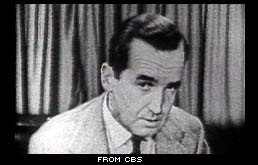|
The Broadcasts of A Resource for ©2005 |
 |
WORLD WAR II
Background
In 1937, Edward R. Murrow was sent by CBS to set up a network of correspondents to report on the gathering storm in Europe. He assembled a group of young reporters whose names soon became household words in wartime America, among whom were William Shirer, Charles Collingwood, Bill Shael, and Howard K. Smith. The group, which came to be known collectively as “Murrow’s Boys,” reported the whole of World War II from the front lines with a courage and loyalty inspired by Murrow’s own fearlessness. During the war Murrow flew in more than twenty bombing missions over Berlin, and along with Bill Shadel was the first Allied correspondent to report the horrors from the Nazi death camps.
(Source)
Here is an excerpt from a radio interview with author Bob Edwards, who describes Murrow’s innovative plan to allow American listeners to hear
bombs dropping on London:
“Murrow wanted to get up to the rooftops in 1940, so you could hear the Blitz. This was 1940. People had heard play war and heard dramatic programs imitating war. I don’t think too many people had heard an actual war unless they had been in one themselves. There were some live broadcasts from the Spanish Civil War battlefields in the late ’30s. But most people had not heard a war. And Murrow took you up to the rooftops of London and opened the microphone, and you heard bombs dropping, you heard the antiaircraft fire, you heard the police sirens and the whistles of the air wardens. Pretty dramatic stuff in 1940. That had to make a real impression.
And that was another important function of Murrow. The British government was going to deny him access to the rooftops, because they thought the German planes could hone in on that radio signal and make the broadcasting house, the BBC in London, make that a target.
Churchill understood that having Murrow do live broadcasts of the Blitz for an American audience—America, remember, was neutral—Churchill desperately needed American help. He realized this was the best propaganda he could possibly have, to have Murrow broadcasting to the United States and having Americans realize what their British brothers and sisters were going through.
And that’s exactly what happened. Churchill cleared the way for Murrow to go to the rooftops, and he later credited those broadcasts with the Lend-Lease, the act by which America broke its neutrality. Roosevelt started helping Britain with old ships and other material, all of this of course prior to the United States entering the war in 1941 after Pearl Harbor.” (Source)
Listen: London rooftop during the blitz – 9/20/40
From Trafalgar Square during an air raid
(audio files above courtesy of “Old Time Radio”)
Listen: Night Raid on Berlin 12/3/43 (Transcript )
Listen: Murrow reports live atop a deliberately undisclosed building on events around and over London as enemy planes fly overhead. (source)
Listen: Murrow live reporting from Piccadilly Circus in London amidst a crowd of jubilant Britains celebrating the end of the war.
Read: Edward R. Murrow’s “Orchestrated Hell”: A Rhetorical Analysis
Share This Page:


